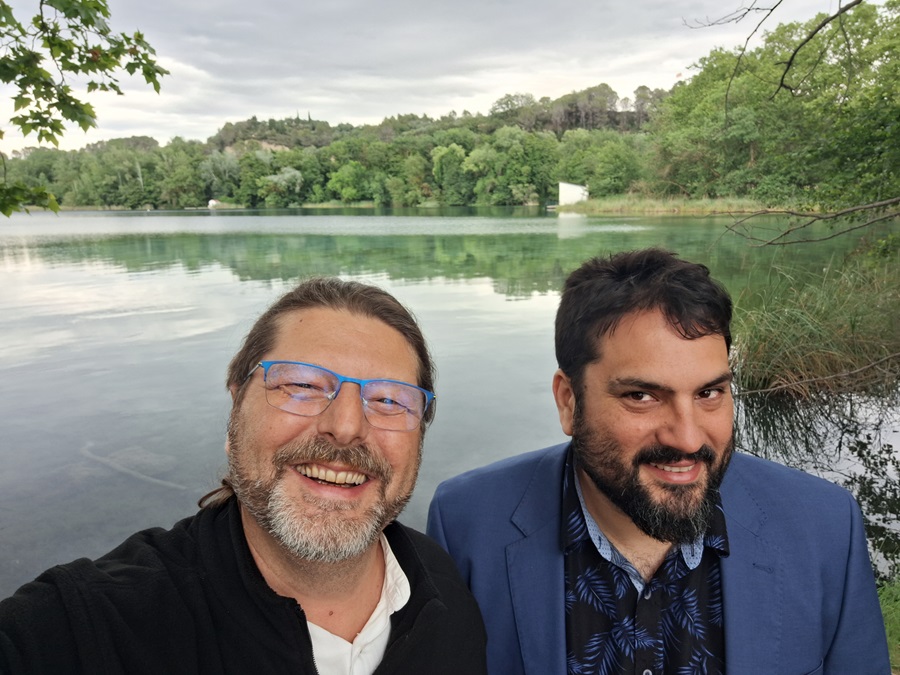- Face to face
- 20 de September de 2024
- No Comment
- 12 minutes read
Andreu Navarra: “The school is a community, not a market”

FACE TO FACE WITH
Andreu Navarra, writer and history teacher
Andreu Navarra: “The school is a community, not a market”

I met Andreu Navarra in 2020 and everything happened very quickly. This young Catalan writer and historian, born in Barcelona in 1981, seems like a Renaissance man. The volume of knowledge you can hear from him denotes an intense cultural career. Graduated in Hispanic Philology, he obtained the Extraordinary Degree Award and enjoyed a Predoctoral Research Training Grant from the Generalitat de Catalunya with which he obtained a doctorate in Hispanic Philology from the University of Barcelona. Since then he has not stopped publishing.
We can mention, for example, the essays ‘La región sospechosa’, ‘Aliadófilos y germanófilos en la cultura española’, ‘El Regeneracionismo’, ‘El Ateísmo. La aventura de pensar libremente en España’, ‘El espejo blanco’. Viajeros españoles en la URSS’, ‘La Revolución imposible. Vida y muerte de Andreu Nin’ or ‘El comunismo en España’ among many others. He is also the author of the novels ‘Hojas’ and ‘Una especie de aventura’. Besides writing books, more than twenty by now, we should mention his critical and contrasting vision of the current educational system with books such as ‘Prohibido Aprender’.
But far from his professional career, and when you meet him personally, his conversation becomes sincere, rich and human, a conversation that has started a multitude of projects that still serve as a link for us. In 2020 we invited him as a speaker to the IX Secondary School Conference. Shortly afterwards, and during a meal, we came up with the idea of publishing a several hands book to denounce the poor state of the national educational system. And we got to work on it. The book came out in 2022 with the collaboration of sixteen educational experts from all over the country. Its title said it all, ‘La Educación Cancelada’. But Andreu is never quiet and he has recently surprised us with a new, highly critical book on the worsening of education. The title is once again revealing, ‘Volver a Aprender’. It is therefore necessary to interview this restless author who does not stop launching great projects from his prodigious mind.
What drives you to write so many books?
The books themselves drive me. It’s my way of life. If I don’t write one day I go mad. I’m a graphomaniac. That’s the way it is.
Your latest book, ‘Volver a Aprender’, becomes a new critique of the current educational system. Could you explain to me the meaning of its title?
The book arose from the need to abandon or rather to go beyond diagnoses, of which we have many good ones, and start to propose things, move forward, turn the page. What things? Left-wing alternatives that break with the pedagogical nightmare, which adds napalm to the fire of educational collapse.
Like what, for instance?
For example, to give up on digitizing primary school and turn back to teach literature and to extend a classical and humanist model in public schools. I have paid a lot of attention to Markus Gabriel’s neo-enlightenment philosophy. I think we live trapped between extremist options, on the one hand racist and sexist reactionarism, on the other the anti-enlightened pseudo-left that is completely lost in matters of education and does the dirty work for nihilistic capitalism.
“Dropping off education is the quickest way to degrade a democracy”
How can we realize that in educational matters the left is doing the dirty work for the right?
Well, sensible European lefts are constantly talking about the “siliconization” of schools and here we continue with very sectarian proposals of Californian origin that entail accelerated privatization, as if the digital revolution were a salvific movement. But the progress of an oligarchy is not the progress of a society, nor an ethical progress. This seems to me to be the most widespread confusion today. Actually, siliconization is a monopoly that leads us to post-human and semi-totalitarian positions. This is what Berardi and Sadin are writing, and Mark Fisher had previously stated. We cann’t stay so calm while we are being scammed.
You say in your book that “false pedagogy” offers us a utopia. What has happened to serious, rational pedagogy, the one that worked?
It has been banned and has no access to the media, nor visibility in search engines and networks. Any dissident who proposes to bring a little common sense to the digital economic reconversion is neutralized and branded as a fascist or a Luddite or an obsolete monster. Totalitarianisms and cyberpedagogy are both a dictatorship of opinion and plenty of symbolic violence, they always operate in the same way: dehumanizing the dissident, the different one. Nevertheless there are cases such as those of Evgeny Morozov, Diego Hidalgo or Marta Peirano that can bring us some hope.
Silicon Valley, which appears several times in your book, has its origins in the 1960s. Do you think that this change in the technological conception of societies has also dragged education along or has it been a process that is complicit on several sides?
Siliconization is clearly a civil religion, with very diverse ingredients: cosmism of Russian origin, post-human nihilism, capitalist accelerationism, apocalyptic reactionism and technological millenarianism. They announce a ‘New Man’, like all dictatorships, but in fact they impose certain products on us and restrict our future.
“We are the adults who manipulate and impose the Digital Standard”
How do they manage to spread this idea across so many different states?
Because it has a very powerful propaganda device, almost invincible. The appeal of this mass propaganda is very well allied with cyberpedagogy, and thus we have replaced pedagogy, the art of educating and teaching, with monopolistic, privatizing and anti-democratic propaganda.
You suggest that a sensible left-wing agenda would involve to dedigitize. How do you approach this from the perspective of this “rational loophole” that you allude to in your book?
We should teach more technology, more basic and speculative science, more programming, more active uses of technology. What we are doing is producing millions of users in order to do immoral data mining. As a society, we have no forgiveness. It is about time to educate for science, not for technocratic submission and passive doping.
Looking at your personal career, what positive relationships would you establish between your professional growth and the educational training received in primary school?
I had spectacular teachers at the El Sagrer school in Barcelona, and exceptional teachers at the L’Alzina high school. I remember reading Espriu or J.V. Foix in primary school, enjoying Catalan and culture at school. I still remember Salvat-Papasseit poems by heart. Sometimes I have the feeling that the Catalan governments have thrown Catalan literature into the trash. I cannot understand this in any way.
And in secondary school?
In secondary school, I was impressed by Gloria Prado’s 20th century Spanish Literature classes and the Philosophy course given by Professor Jesús del Pozo. In some way, everything I have been able to think or write has this starting point.
“We have sold the school to catering giants and app sellers”
Imagine you’d have been trained in the current educational system, do you think it would have improved or worsened your current professional projection?
Logically it would have worsened. Primary school taught me to read, count, think, and a lot of ethical values. The base of pizza. In secondary school came the more advanced content: physics, history of philosophy, poems, theater… I was an embryonic actor and writer. Maybe I was very lucky, and with many friends that I still keep we went out on the street to exchange punk and heavy metal cassettes. I have the feeling that we are abandoning youth to a nihilistic solitude that serves turbo-capitalism, I mean techno-feudal, interests. It is we adults who manipulate and impose the Digital Standard.
What do you think of the youth who’s coming up?
Well, I don’t think that youth will accept this state of affairs. I think that young people will be better than us because today’s leaders and people who are my age show public cynicism and shameful negligence. To abandon education is the quickest way to degrade a democracy. Likewise, to overcome post-market democracy we should exile all cyber-nihilistic propaganda to focus on people and knowledge.
Can students learn by themselves with teachers as guides?
The current false student-centrism is nothing more than a market of applications and retro-technology designed to degrade the popular majorities and the faceless citizenry condemned to never leave their ghetto. In other words, competency-based pedagogy is designed to lumpenize our societies.
“Competency-based pedagogy is designed to lumpenize our societies”
Looking at your professional career, how do you think the current education system should be improved?
Moving to a classical and neo-Enlightenment model throughout the public network. Change of economic structure, end of blatant segregation by economic levels in our country. Literature and History, from primary school. Return to theoretical and scientific thinking and training of attention and capacity for abstraction. Dedigitizing primary school. End of the pedagogical dictatorship, that is, going back to methodological pluralism, elimination of pseudoscientific concepts such as DUA or Multiple Intelligences. Stop on million-dollar funding of intrusive foundations: no public money outside the Public. Real inclusion, with permanent specialist staff and all the necessary reinforcements wich are currently being cut. An expensive and luxurious public system for all, without reactionary digital solutionisms, not the ruinous cuts of today. Drastic changes in teaching careers. Ah, very important: curricula based on subjects and not on competencies, wich means progressive, structured, intelligible curricula; dignifying the teaching profession, ending the sectarian sleight of hand of the most outmoded pedagogy. Teaching and learning are not things that fascists do, on the contrary: if you want to organize a dictatorship, the first thing that totalitarian bureaucracies have done is banning knowledge from school in order to practice abusive social engineering and subjugate both the social majorities and tomorrow’s dissidents.
But ideologies seem to be a part of ourselves, and from a utopian perspective, what would be your wish for the personal or national environment in which you live?
I would like a good part of our left to leave behind declarative rhetoric and clichés, and abandon the neo-Calvinist sermon to truly combat the great contemporary problem in the West right now: Technofeudalism. There are too many people who say they are republicans, but they are is Carlists, with a discourse that is too provincial, merely irritating. Look at what is happening with housing, look at what is happening with racist populism and extractive pedagogy. How do we conjure up the fear generated by the media that serve the policies that liquidate public spaces? By rebuilding communities. The school is a community, not a market. Students cannot continue to be a commodity or a source of cyber-proletariat. We have sold the school to catering giants and app sellers. I do not like this necropolitics of cyber-surveillance or the current blatant plundering. Public services, political and labour dignity. Back to a left focused on economic problems, among many others, would be a very good thing.
___
More information:
Review of Andreu Navarra’s book Volver a aprender, by Xavier Massó
Webinar with the author, Andreu Navarra (September 25, 2024)
Source: educational EVIDENCE
Rights: Creative Commons


